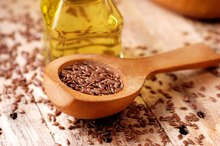Will Sunflowers Give You Allergies?
Sunflower seeds, whether eaten raw or roasted, are a mainstay of vegetarian and vegan diets -- what most people think of first when they think of sunflowers as a food crop. Yet sunflower oil is their main U.S. use. Unfortunately for those who love the large, cheery flowers and their nut-like seeds, people can develop allergies to both.
If you are experiencing serious medical symptoms, seek emergency treatment immediately.
Sunflowers
The sunflower is the only plant grown worldwide as a seed crop that was domesticated in what is now the U.S. It is highly valued in part because of its quick maturity. Most varieties produce mature seeds within 90 to 100 days of planting. Sunflower oil is premium food oil because of its low level of saturated fats, mild flavor and light color. It can also tolerate high cooking temperatures. Sunflower seeds are more prominently marketed as a snack food, though it is a good-quality, meat-free protein source. Meal left over after commercial sunflower oil extraction is used as livestock feed. Sunflower seeds – especially the high-oil, black-seeded type – are also sold as birdseed.
- The sunflower is the only plant grown worldwide as a seed crop that was domesticated in what is now the U.S.
- It is highly valued in part because of its quick maturity.
- Sunflower seeds are more prominently marketed as a snack food, though it is a good-quality, meat-free protein source.
Pollen Allergy
Allergy to Cardboard
Learn More
According to the Asthma and Allergy Foundation of America, among Americans allergic to pollen-producing plants, about 75 percent are allergic to ragweed 1. A 2002 study reported by AllAllergy.net suggests that 30 percent of those with allergies to ragweed or other plants in the composite plant family also react to sunflower pollen. But sunflower pollen alone has high allergenic potential, especially when people regularly come in contact with it. Systemic allergic reaction – runny nose, congestion, itchy eyes, tearing and facial swelling – has even been reported to pollen packaged in sunflower seeds.
- According to the Asthma and Allergy Foundation of America, among Americans allergic to pollen-producing plants, about 75 percent are allergic to ragweed 1.
- A 2002 study reported by AllAllergy.net suggests that 30 percent of those with allergies to ragweed or other plants in the composite plant family also react to sunflower pollen.
Seed and Oil Allergy
The Food Allergy & Anaphylaxis Network points out that while only eight foods account for 90 percent of food allergies – milk, egg, peanut, tree nuts, fish, shellfish, wheat and soy -- people can become allergic to almost any food. Sunflower seeds can cause a very severe, life-threatening allergic reaction known as anaphylaxis or anaphylactic shock. People allergic to sunflower seeds may also react to sunflower oil. Highly refined oils don’t contain the protein that causes allergic reactions, but not all sunflower oil is highly refined. Anaphylaxis after ingesting honey containing sunflower pollen has also been reported.
- The Food Allergy & Anaphylaxis Network points out that while only eight foods account for 90 percent of food allergies – milk, egg, peanut, tree nuts, fish, shellfish, wheat and soy -- people can become allergic to almost any food.
Pollen Allergy Care
What Are the Allergy Symptoms to Eucalyptus Pollen?
Learn More
The Asthma and Allergy Foundation of America recommends that people allergic to various types of pollen should stay indoors when there is a lot of pollen in the air and use HEPA filters on air conditioners 1. Over-the-counter antihistamine and decongestant medications usually offer relief. If they don't help, see your doctor for prescription options. Also consider desensitization treatments or immunotherapy to reduce allergic reactivity. Gardeners who grow sunflowers for cut flowers might want to consider growing pollen-free or sterile varieties.
- The Asthma and Allergy Foundation of America recommends that people allergic to various types of pollen should stay indoors when there is a lot of pollen in the air and use HEPA filters on air conditioners 1.
Seed Allergy Care
Absolute avoidance of sunflower seeds and other food-related allergens is the only way to prevent an allergic reaction, so read food labels very carefully and see your doctor if you suspect a sunflower seed allergy. Because severe allergy symptoms of anaphylaxis include breathing problems and quickly become life threatening, often the only option is self-treatment with injectable epinephrine -- available by prescription through your doctor -- which allergic individuals should carry at all times.
Related Articles
References
- Asthma and Allergy Foundation of America: Ragweed Allergy
- University of Missouri Extension; Sunflower -- An American Native; Robert L. Myers, et al.; October 1993
- Seeds, sunflower seed kernels, toasted, without salt. FoodData Central. U.S. Department of Agriculture. Published April 1, 2019.
- Defeat Diabetes Foundation. Nuts and Seeds: Energy and Nutrient-Dense Foods.
- Kaczmarczyk MM, Miller MJ, Freund GG. The health benefits of dietary fiber: Beyond the usual suspects of type 2 diabetes mellitus, cardiovascular disease and colon cancer. Metabolism. 2012;61(8):1058-1066. doi:10.1016/j.metabol.2012.01.017
- Yang J, Wang HP, Zhou L, Xu CF. Effect of dietary fiber on constipation: A meta analysis. World J Gastroenterol. 2012;18(48):7378-7383. doi:10.3748/wjg.v18.i48.7378
- Anderson J, Baird P, Davis RH, et al. Health benefits of dietary fiber. Nutrition Reviews. 2009;67(4)188-205. doi:10.1111/j.1753-4887.2009.00189.x
- Lattimer JM, Haub MD. Effects of dietary fiber and its components on metabolic health. Nutrients. 2010;2(12):1266-1289. doi:10.3390/nu2121266
- Kunzmann AT, Coleman HG, Huang WY, Kitahara CM, Cantwell MM, Berndt SI. Dietary fiber intake and risk of colorectal cancer and incident and recurrent adenoma in the prostate, lung, colorectal, and ovarian cancer screening trial. Am J Clin Nutr. 2015;102(4):881–890. doi:10.3945/ajcn.115.113282
- Vitamin E. National Institutes of Health Office of Dietary Supplements. Updated February 28, 2020
- Antioxidants: In Depth. National Institutes of Health, National Center for Complementary and Integrative Health. Updated November 2013
- American Academy of Allergy Asthma & Immunology. Cross Reactivity of Seed Allergens.
- Manatakis DK, Acheimastos V, Antonopoulou MI, Balalis D, Korkolis DP. Gastrointestinal seed bezoars: A systematic review of case reports and case series. Cureus. 2019;11(5):e4686. Published 2019 May 17. doi:10.7759/cureus.4686
- Manne JR, Rangu VM, Motapothula UM, Hall MC. A crunching colon: Rectal bezoar caused by pumpkin seed consumption. Clin Med Res. 2012;10(2):75-7. doi:10.3121/cmr.2011.1016
- Seeds, sunflower seed kernels, dry roasted, with salt added. USDA FoodData Central. April 1, 2014.
- National Sunflower Association. Frequently asked questions.
Resources









